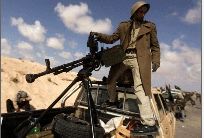
(Mar. 21) - A Libyan rebel on Monday mans a heavy machine gun ahead of an anticipated attack on the town of Ajdabiya, held at the time by forces loyal to dictator Muammar Qadhafi. A number of European officials expressed concern that Qadhafi might seek to employ Libya's remaining mustard blister agent stockpile in a bid to retain power in the strife-torn nation (Patrick Baz/Getty Images).
Western spy satellites have been monitoring an isolated site in the Libyan desert where the Qadhafi government has stored its remaining stockpile of mustard blister agent in six large containers. No unusual activity has yet been spotted at the garage site, the Washington Post reported on Saturday (see GSN, March 14).
(Mar. 21) - A Libyan rebel on Monday mans a heavy machine gun ahead of an anticipated attack on the town of Ajdabiya, held at the time by forces loyal to dictator Muammar Qadhafi. A number of European officials expressed concern that Qadhafi might seek to employ Libya's remaining mustard blister agent stockpile in a bid to retain power in the strife-torn nation (Patrick Baz/Getty Images). Western leaders continue to be concerned about the possibility that besieged Libyan dictator Muammar Qadhafi could attempt to use his remaining cache of chemical warfare materials against opposition forces. U.S. forces took a lead role over the weekend in international efforts to impose a no-fly zone over Libya and to halt attacks by Qadhafi loyalists on civilians and opposition fighters. President Obama, however, said no U.S. soldiers would be deployed on the ground.
Qadhafi's regime is estimated to possess 9.5 metric tons of mustard blister agent and a quantity of chemical warfare precursor materials that have yet to be eliminated as mandated by the Chemical Weapons Convention. Thousands of empty aerial munitions were previously destroyed, eliminating Qadhafi's ability to wage a chemical air attack. Blister agent disposal work was broken off last month, ostensibly due to technical problems with the heating system of a chemical neutralization plant housed next to the garage. Two international monitors observing the disarmament operations left the site, as their presence was only called for during active destruction operations (see GSN, Feb. 2). Popular protests against the Qadhafi regime broke out shortly afterwards.
Tripoli's envoy to the Organization for the Prohibition of Chemical Weapons recently told OPCW chief Ahmet Üzümcü that the mustard agent was still secure and that Qadhafi remained in adherence to the CWC treaty, according to previous reports.
While U.S. officials say it would be difficult for Qadhafi to militarize the mustard agent for use in a strike should he decide to do so, some European leaders have voiced worries that the longtime Libyan strongman could attempt to use the deadly chemicals in a last-ditch effort to remain in power. "There are lots of rational reasons why Qadhafi could decide not to use them -- not the least of which is the absence of a reliable and safe delivery method -- but we all know that rational decision-making is not always the hallmark of dictators," a U.S. official said. "It will come down to a decision by one man on how to proceed." Tripoli's ex-envoy to the United Nations, Abdurrahman Mohamed Shalgham, who publicly broke from Qadhafi in February, said earlier this month that "I do expect that he's going to attack [rebel stronghold] Benghazi with chemical weapons," if loyalist forces reach the Western city.
French President Nicolas Sarkozy threatened that his country would carry out "targeted" responses against Qadhafi's forces should he attempt to use the mustard agent. The United Kingdom has also warned of harsh reprisals against any possible chemical attack.
The mustard storage site is protected by a barbed wire fence, a berm and a small-size security force, according to sources who have viewed photographs of the site. Roughly 20 percent of the remaining blister agent has gelled over time, making the chemical difficult to deploy, according to diplomats and Western officials. The remaining material is in liquid form that theoretically could be sprayed from helicopters or airplanes -- a highly risky endeavor for the air crew that could prove lethal on the ground only if the toxin did not freeze beforehand.
"It would be little more than a terror weapon, with localized effects, and no particular military significance," chemical weapons expert Jonathan Tucker said. Tripoli's other weapons of mass destruction efforts -- a drive to build a nuclear warhead and a missile program that included a cache of Scud missiles with the ability to strike neighboring nations -- were halted years earlier and the delivery vehicles surrendered to the United States in 2004 (see GSN, March 1).
"You can't say that what's left there is ash and trash, but pretty close," former Bush administration disarmament specialist Paula DeSutter said. Some U.S. officials still disagree over the possibility that Qadhafi could have retained some undeclared WMD materials, such as infectious pathogens or nerve agents that he might seek to use in a final bid to stave off the toppling of his regime.
Secretary of State Hillary Clinton hinted at the possibility in remarks made to House of Representatives lawmakers earlier this month: "[Qadhafi] still does, as you probably know, have some remaining chemical weapons and some other nasty stuff that we're concerned about" (Jeffrey Smith, Washington Post, March 19).
Joint Chiefs of Staff chairman Adm. Michael Mullen on Sunday said Qadhafi's remaining mustard agent was "something he could do a lot of damage with," Agence France-Presse reported.
"It's something we're watching very closely," Mullen said in an interview with CBS of the possibility that Qadhafi might try to deploy the chemical toxins (Agence France-Presse/Univision.com, March 20).
This article is from.

